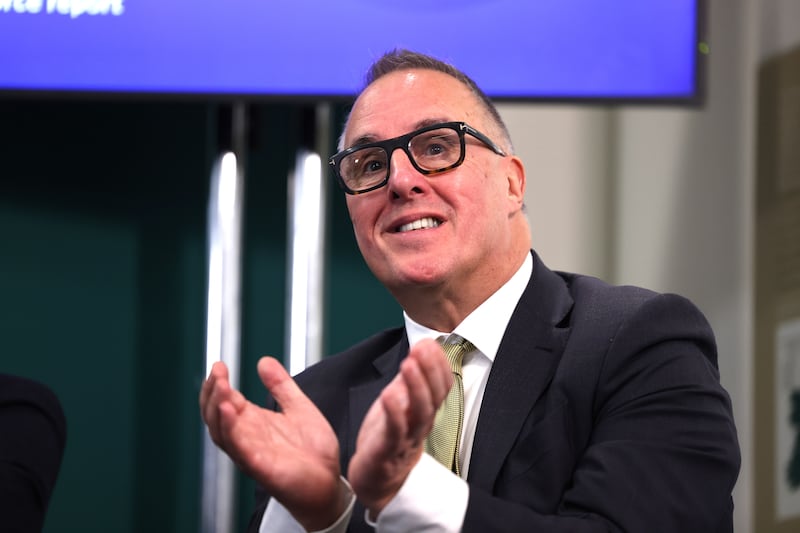People joining the Department of Foreign Affairs probably do so in the hope of a glamorous diplomatic posting. So spare a thought for the unfortunate mandarins in Iveagh House charged instead with reading Project 2025, the 900-page policy diatribe formulated by an ultraconservative think tank in the United States seeking to influence Donald Trump’s presidency.
In response to a parliamentary question from Fianna Fáil’s Malcolm Byrne last week, Micheál Martin confirmed that Project 2025 was on the radar of the department, saying it was considering recent reports by “a variety of US-based think tanks which may be relevant to policy development by the new US administration, including the policy proposals contained in Project 2025”.
While Donald Trump has publicly distanced himself from some of its more radical proposals, much of its Christian nationalist doctrine was written by former Trump staffers, while some of its authors have already been appointed by Trump to his new administration. Thus the need for Ireland to take it seriously.
“While Project 2025 describes itself as a presidential transition project aiming to ‘pave the way for an effective conservative administration’, it is not formally linked to President Trump’s administration. The extent to which some of its proposals will be taken up by the incoming administration remains to be seen,” Martin told Byrne.
Offaly County Council rejects Kilduff artists’ commune
Offaly natives have to endure the unfortunate nickname of Biffo. But property investor Tony Kilduff, who hails from the faithful county, is anything but ignorant, especially when it comes to art.
Kilduff, who made a fortune in the dotcom boom of the 1990s, is a patron of the Royal Hibernian Academy of Arts, where he is also an honorary member. He also has a substantial art collection himself, focusing on contemporary works. Now he wants to create an artists’ retreat in his native Clonfinlough in Co Offaly.
Kilduff applied for planning permission last year to create a “small, self-sufficient commune of artists that will live and work” in four studios on a 40-acre parcel of land he recently acquired. The buildings will be run on solar panels with battery storage, effectively off-grid.
A planning application submitted on behalf of Kilduff late last year set out his plans for a retreat similar to Noelle Campbell-Sharp’s Cill Rialaig in Co Kerry, which will “enrich the local community”.
The idea is that artists will be able to stay for between three and 12 months, with some selected by the RHA, which has endorsed the project, according to the application.
Offaly County Council put a spanner in the works shortly before Christmas, refusing permission because of fears the additional houses could negatively affect the Fin Lough Special Area of Conservation. But last week Kilduff appealed the decision to An Bord Pleanála with a decision due in May.
Quack, quack, you’re sacked
Payment technology giant Stripe, founded by Tipperary brothers Patrick and John Collison, added insult to injury last week in an email to about 300 employees being laid off in the United States. For reasons unknown, the email breaking the bad news to the staffers included an image of a cute, yellow cartoon duck.
The tech company, which has 8,500 staff across the world including about 600 in Ireland, later apologised for the, er, duck-up, although it has yet to emerge who was responsible for flipping the bird to the confused workers.
Irish billionaires can live with the levy
Ireland’s 11 billionaires saw their wealth grow by a third to €50 billion last year, according to a report last month by Oxfam Ireland, timed to coincide with the World Economic Forum in Davos.
If their wealth is on the rise, so too should be the domicile levy, shouldn’t it?
The levy was introduced by the late Brian Lenihan, then minister for finance, during the dark days of the economic crash in 2010 to ensure that super-wealthy Irish people who live abroad for tax reasons make at least some contribution to the exchequer.
But despite the rising fortunes of the fantastically wealthy, the levy hasn’t risen concordantly. Figures provided by Revenue show that in 2021, €1.6 million was collected from 13 nondomiciled Irish residents, rising to €1.96 million from 12 people in 2022. In 2023, the most recent year for which figures are available, €2.46m was collected from 15 people. A modest increase but it’s unlikely to be keeping any of them up at night.
[ It’s a good time for a wealth tax on Ireland’s 11 billionairesOpens in new window ]
Winemakers buy new Dublin base for their pizza business
It looks like Naomi Murtagh, a daughter of the Kingspan billionaire Eugene, is planning to spend more time in Ireland. In recent years Naomi and her husband, Andrew Eakin, have been running Château Puynard, a vineyard in Bordeaux, and recently acquiring a second winery, Château Magdeleine Bouhou.
The couple have had a house in Killiney, Co Dublin, for several years but late last year they sold it and have now bought a larger pile in Killiney on four acres with views across Dublin.
Flagstaff Hill, their new home, was originally on the market for €4 million. The property price register records their purchase for €2.8 million, although that only includes the price of the house and one acre.
The reason for the new base? Pizza. The couple will shortly launch Squaredish, a new pizza restaurant at 25 St Stephen’s Green in what was rather incongruously home to a Eurogiant discount store until recently. So now they can both wine and dine their clientele.
Alpha mail: An Post boss blames British counterparts for boomerang parcel

An Post’s David McRedmond is never not on. Last week the retired rugby referee Nigel Owens complained on Twitter about posting a signed jersey to Ireland for a charity event six weeks ago. “And now it’s been sent back in this state because customs refused it. Bloody Brexit definitely is not working,” he said, adding an image of the battered parcel.
McRedmond leapt to the defence of An Post, assuring the Welsh man that the Irish postal service was not to blame.
“Ah, very sorry about that. EU Customs require electronic data matching for parcels,” he said. “The data is provided via the sending postal company (Royal Mail). It may be that your local post office is not recording the electronic data. It is all very unfair on citizens.”
He never fails to deliver.
Source link



